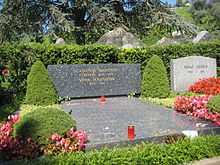Véra Nabokov
| Véra Nabokov[1] | |
|---|---|
| Born |
Vera Evseevna Slonim January 5, 1902 St. Petersburg |
| Died |
April 7, 1991 (aged 89) Vevey |
| Occupation | Editor, translator |
| Spouse(s) | Vladimir Nabokov |
| Children | Dmitri Nabokov |
Véra Nabokov (January 5, 1902 – April 7, 1991) was the wife, editor, and translator of Vladimir Nabokov, and a source of inspiration for many of his works.
Early life and immigration
Born Vera Evseevna Slonim in St. Petersburg into a Jewish family, she was the second of three sisters. Her father, who had studied law, was successful in the tile and timber businesses, among others. With the turmoil of the Russian Revolution, the family moved to Moscow, and after fleeing through Kiev, Odessa, Istanbul, and Sofia, arrived in Berlin, where they joined the large Russian émigré population.
Marriage to Nabokov
In Berlin her father co-founded a publishing firm, Orbis,[2] and Vera worked in the office.[3] There when Vladimir Nabokov was considering a project to translate Dostoyevsky in English, he met Véra's father, and he started playing chess with him.[3] Véra admired Vladimir's poetry, which was well-known through émigré publications, and went to his readings. The details of the first meeting between Véra and Vladimir are uncertain; he maintained it was at a charity ball on May 8 (or 9), 1923, but she denied this story. Sometime after that date, the two had a long conversation overlooking a canal, at which Véra wore a mask and recited Vladimir's poetry.[4] They were married on April 15, 1925. She ended her own budding career as a writer to support her husband as critic, reader, and typist, and sustained the family through her work as secretary and translator. Their son, Dmitri, was born on May 10, 1934.
After moving to the United States of America in 1940, she learned to drive and chauffeured her husband on many field trips, notably in the North American West, to hunt butterflies. To protect him she carried a handgun. Nabokov relied on her in his work and "would have been nowhere without her."[5] During his lectures, she would sit in the front row. She was his inspiration, editor, and first reader; all his works are dedicated to her. Lolita was saved by her from the flames more than once. However, personal letters pertaining to her and her marriage were destroyed.
Return to Europe and death

Upon the couple's return to Europe in 1960, she resided with her husband at the Montreux Palace Hotel where she continued to manage his affairs, and after his death in 1977, his estate. Upon his death, Vladimir had requested his final work, The Original of Laura, be burned, but neither Véra nor her son Dmitri could bring themselves to destroy the manuscript, and eventually it was published in 2009. In her late eighties, she translated Pale Fire into Russian. She stayed at the Palace until 1990, and died the following year at Vevey.
References
- ↑ At least by the 1950s, she signed letters with the "é" and omitting the final "a" that her surname would have in Russian. Schiff, Stacy (1999). Véra (Mrs. Vladimir Nabokov). Pan Books Ltd. p. 219. ISBN 0-330-37674-8. Retrieved 2012-02-23. Online extract at New York Times
- ↑ Stacy Schiff, Chapter 1
- ↑ 3.0 3.1 Amis, Martin. Visiting Mrs Nabokov: And Other Excursions. pages 115-118. Penguin Books (1993) printed 1994. ISBN 0-14-023858-1
- ↑ Stacy Schiff, pp. 5–6
- ↑ Stacy Schiff, p. xii
External links
- PBS Online NewsHour
- Woman behind 'Lolita': Nabokov's wife, Véra, was muse, editor and selfless partner
|